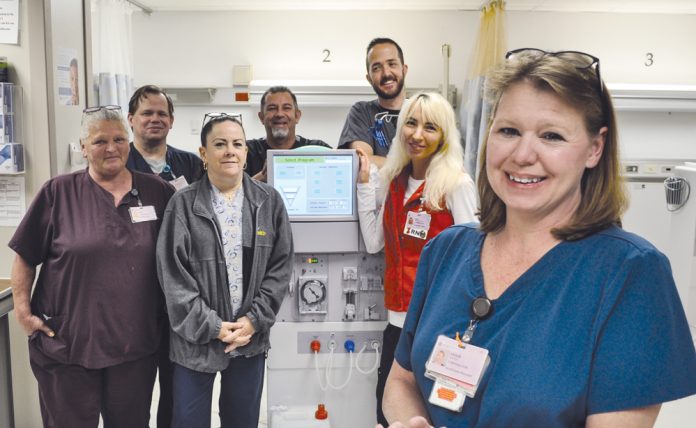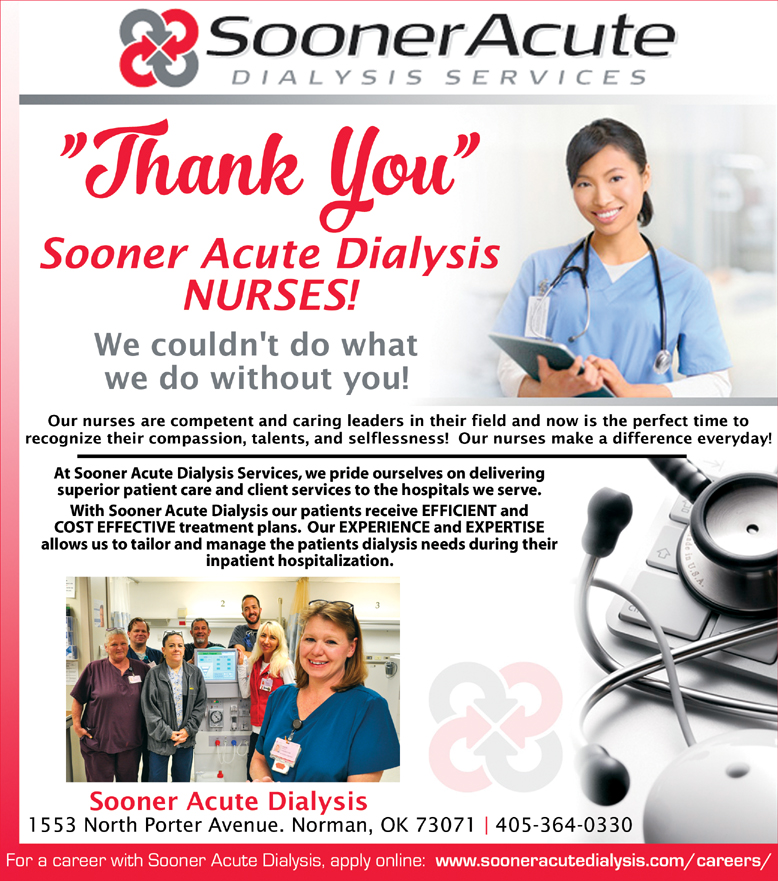
It’s 6 a.m. and Sooner Acute Dialysis Administrator Leslie Whiles is on the phone “directing traffic.”
Coordinating inpatient dialysis treatment for patients across multiple health care facilities, Whiles starts mornings early and finishes days late.
But she doesn’t mind, especially when she’s sending nurses like Scott Willis, RN, out on the floor.
Willis has worked for Sooner Acute for six of his 15 years as a nurse. A favorite on the floor and always with a huge smile, the former EMT comes to patients’ rescue each and every day.
“Being there for the patient. We perform such an important role in patient care,” Willis said, recently before starting his day at Norman Regional Health System. “When their kidney functions are down or obsolete … I feel dialysis improves their overall outcomes.
“In dialysis … it’s one of the most important functions in healthcare. We have immediate results. Within a day we can show results.”
That’s why Sooner Acute is such a vital partner for health care providers across the state.
Whiles said the dialysis program grew from a rising demand for dialysis services at hospitals and acute care facilities.
Sooner Acute services facilities who outsource their dialysis programs – both inner city and rural hospitals.
The Acute Dialysis market is dominated by a few larger players who mainly specialize in Chronic Dialysis.
That’s why there’s a demand for an independent, more flexible company specializing only in Acute Dialysis.
Local and independent since 2009, Sooner Acute isn’t affiliated with any chronic dialysis companies nor does it answer to board of directors concerned about profit margins and stock prices.
The result is a high-quality, service-oriented company focused on the patient.
Being an inpatient acute dialysis program, Sooner Acute’s on-call nurses can respond to after-hours urgent/stat cases. While routine dialysis treatments can be arranged for any time during the patient’s inpatient stay, Sooner Acute focuses on staffing client hospitals to provide services as needed, around the clock, without hidden fees – just one set fee per treatment. This has proven to be very cost efficient to the hospitals they service.
Since opening, the Joint Commission, VHA, and the Oklahoma Department of Health has inspected and passed the Sooner Acute Dialysis program with no deficiency and 100% compliance.
“Our stable, local nursing staff, managers, medical directors and support staff have a long history of working in the acute dialysis field,” While says.
Sooner Acute Dialysis Services’ comprehensive services to hospital clients includes:
* Inpatient Hemodialysis
* Inpatient Peritoneal Dialysis
* C.R.R.T.
* Biomedical Services for Hemodialysis
Only well-trained, competent and fully qualified registered nurses and licensed hemodialysis technicians make up the Sooner Acute Dialysis Services team. All members are licensed and qualified to perform hemodialysis treatments within the acute hospital setting.
It was this type of setting Willis was looking for when he was a paramedic.
He longed for more patient care and his wife, an LPN at the time, gave him the nudge when he needed it to go to nursing school.
Once he graduated he went straight into trauma care but his experience with plasmapheresis led into dialysis, which led him to Whiles.
His career prospects suddenly changed.
“The autonomy you have and the docs we have here are great,” Willis said. “We have a lot of standing orders.”
“(Patients are often) pretty much scared. It’s too much information all at once. Nine out of 10 times we have to get dialysis done now.”
While he’s getting the equipment ready, Willis takes the time to get to know his patients. He’s with them for the next three to four hours and wants them to know what’s ahead.
And there are many days Willis has a full patient load but large fluctuations in patient volume are no problem.
That’s why Whiles is up early each morning directing traffic.
And with most of Sooner Acute’s dialysis staff cross-orienting at multiple hospitals there’s always someone like Willis there to meet the need.













